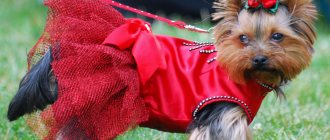Author of the article
Maryana Popova
Reading time: 7 minutes
AA
The profession of a dog handler is perhaps the sweetest in the police. In part, it is similar to the profession of a trainer and animal psychologist - that’s why the people who work in it are versatile and interesting. Why is the profession called that? The name of the profession comes from the Greek words kynos - the genitive case of the word “dog” and logos - word, doctrine. We will tell you all the most interesting things about the profession: where you study, what specialists do and how much they earn - in this article.
Profession dog handler - what does he do?
A person with this profession is engaged in training dogs in order to perform various tasks necessary to facilitate the work of the police and military: search, protection, rescue, etc. He studies the physiology and behavior of animals and uses his knowledge to benefit humanity.
Dogs trained by these employees become full-fledged police officers: they, like humans, search for and track down criminals, pick up leads, look for weapons and drugs. Often, dogs are more effective in a particular matter than the police themselves.
The profession is divided into the following specializations:
- Nutritionist (develops menus for different types of dogs)
- Handler - (preparing dogs for exhibitions)
- A person involved (a person on whom a dog is set during training to catch criminals; usually he works in a voluminous padded suit so that the animal does not harm him)
- A specialist (instructor, trainer) is engaged in practicing animal behavior, preparing and instructing service dogs, and can also provide assistance in raising pets.
- Expert (specializes in knowledge of all breeds, including the behavioral and structural characteristics of each breed. These specialists often work as judges at dog shows).
- Animal psychologist (expert in dog psychology).
Specializations in cynology
A dog handler is the general name of a profession that is divided into narrow specializations that study the peculiarities of the behavior of dogs; activities are carried out to educate dogs, taking into account the specific specifics of the use of animals.
There are several areas of dog development depending on the type of main specialization:
- The expert knows everything about breeding specific dog breeds, characteristics, years of life and health.
- A specialist instructor with a protection assistant is engaged in training animals in conducting search operations for explosives, narcotic substances and people under the rubble. Trains dogs to catch criminals and act as guides for blind people.
- The trainer knows the principles of training and knows how to properly teach puppies various commands.
- Handler is a specialist who prepares pets for various shows at exhibitions.
- A fitness trainer trains a dog to maintain its ideal physical shape.
- A nutritionist knows and recommends how to properly organize animal nutrition to prevent obesity. Creates a menu and tracks the dog's weight.
- The animal psychologist, together with the dog’s owner, monitors the reasons for the dog’s inappropriate behavior and gives recommendations on how to properly raise the pet.
Required Skills
A prerequisite for this work is a love for dogs - otherwise the specialist simply will not find a common language with the wards, and, therefore, will not be effective. It is also impossible for a person who is allergic to wool to work in this service.
It is important to remember that not all canine individuals can be trained, so a professional dog handler must have great patience and calm. For dogs, he must become a leader, otherwise she will not listen to him - therefore, the specialist must have certain leadership qualities.
Basic training methods
In total, there are 11 methods of developing skills in cynology:
- Guidance method – the trainer encourages the dog to perform the required action, following the motivation (a treat or a toy);
- Push method - the trainer pushes the dog to the desired activity using a leash or hands, creating unpleasant sensations that immediately stop after the command is completed;
- Passive flexion method - the method is similar to sculpting; if the animal does not resist, it is given the desired pose simultaneously with a voice command;
- Behavior selection method - a command is given when the dog performs a voluntary action. For example, a pet wants to lie down - the instructor gives the command “lie down” and encourages the dog;
- A method of strengthening a behavioral trait - suitable for animals that have already developed skills, but not quite correctly - better performance than the previous one is reinforced;
- A method of reducing a behavioral act to a single element, by reinforcing only one element from a chain of actions;
- Method of alternative behavior - with the help of certain auxiliary props, conditions are created for the dog under which the desired behavior becomes the only possible one;
- Method of play behavior - the dog’s need to play and the hunter’s instinct are used as motivation;
- Imitation method - used with the help of a previously trained dog, puppies are able to learn by watching others;
- The method of defensive behavior consists in the dog avoiding painful sensations that bring it to the position desired by the trainer;
- The method of aggressive-defensive behavior is used in special training courses; the impacts are so strong that the dog is forced to defend itself.
It cannot be said that any of the above methods is worse or better. Each trainer uses certain methods based on the age, breed of the dog and his own intuition.
Lessons with an instructor
There are several options for dog handlers:
- Training with content is not a cheap pleasure, but it is effective. The specialist works with the dog every day, as a result of which the owner receives an already trained dog
- Self-training under the supervision of a zoopsychologist is the best option; a professional teaches the owner how to control the pet, individually or in a group
- Skills training by a dog handler - in the presence of the owner, the trainer works independently
Choosing a specialist
The choice of a teacher should be taken very seriously. It is necessary to find out from experienced dog owners who is better to contact, and not to buy into advertising on the Internet.
Dog handlers who have their own blogs and channels on the Internet, as a rule, are not the most qualified specialists. All the material filmed about the wonderful training in 5 minutes is pure attraction of attention for making money on advertising. Good professionals don't have time for such nonsense.
Training on the site
Classes at the training site can be held individually or in a group:
- Group classes are cheaper, but less effective. The dog handler may be distracted by another dog and not notice the mistakes of other students.
- Individual training has a very high efficiency, but costs more, sometimes even twice as much. But the instructor’s attention is completely captivated by one animal and mistakes in training are not allowed.
There is no need to visit areas where owners or trainers beat dogs for not following commands. The pet may remember that the playground is scary and subsequently refuse to even go there.
Duration of classes
The average duration of classes with an instructor is from 40 minutes to 1 hour. As a rule, training takes place once a week.
A good trainer shows owners how to properly handle a pet and how skills are developed. The rest of the time he watches how the owners learn independently and corrects mistakes. During a week-long break, the formation of the skill is practiced independently.
The role of socialization in training
During the process of socialization, the puppy learns to calmly respond to extraneous stimuli. This plays a huge role in raising a manageable dog.
Animals with an insufficient level of socialization become nervous, unsure of themselves, and may behave inappropriately in urban conditions. The pet is in a constant state of stress in a new environment and refuses to follow commands.
Dogs raised in conditions of social deprivation behave extremely unbalanced and aggressive towards people and other animals.
Employment - where to work as a dog handler
The scope of work of these specialists is very wide; such specialists can find application in the following structures:
- dog breeding kennels;
- police, FSB, customs and other government security agencies;
- research institutes;
- training centers for pets. Here they can both teach dogs good manners and correct behavior, and work with dog psychology - this is what animal psychologists usually do;
- specialized centers where guide dogs and dogs are trained to help people with cerebral palsy, Down syndrome and other diseases related to neurology
- In animal salons, such a specialist can successfully work as a groomer.
Step-by-step plan for starting a business
To be able to train dogs, you must have a special education. If necessary, you can enter into an agreement with the person who has it. Next you will need to: • register as a business entity; • conduct an advertising campaign; • enter into a contract. Despite the reduction of special training sites, they still exist. In this regard, you don’t have to invest money in rent right away, but in the future it is best to rent a plot of land and install the necessary attributes for training there.
Advantages and disadvantages of the profession
The advantages of the profession include:
- a positive emotional state from constant communication with a four-legged friend (of course, this will only be a plus for someone who loves dogs)
- a simultaneous combination of work and hobby (again, only if your hobby is dog breeding).
Minuses:
- increased risk of injury - after all, during training, the animal may bite or behave in an unexpected way. This applies to young dogs just starting training.
- low salaries. This point mostly applies to government agencies - where dog handlers receive little. But if you go to work, for example, as a groomer and have regular clients (and word of mouth has not been canceled), the earnings can be very decent
How to become a military dog handler or in the police
After receiving higher education, you need to contact the FSB, police or other desired service. A specialist is hired at an initial rate with a minimum salary (it will increase every year). The worker takes the dog from the kennel as a puppy (usually at the age of 2 months) - no one gives an adult dog to the specialist. Next comes the usual service - the specialist works as an ordinary ordinary police officer (if he joined the police) and at the same time raises his pet according to all the rules of service dog breeding.
Salary level for dog handlers
The profession of a dog handler is in demand in the modern labor market. These specialists are required both in law enforcement agencies and in numerous nurseries, clubs, salons that provide haircuts and other pet care.
According to online employee search services, specialists can expect the following salaries:
- The minimum salary
is approximately 20 thousand rubles. - The maximum salary for a dog handler
is approximately 50 thousand rubles.
Mainly required are police dog handlers.
Where do they study to be a dog handler: universities and schools
To work in this field of activity, you must graduate from a university with a degree in Animal Science or a college (technical school) with a degree in Cynology (basic training).
Secondary vocational education in this specialty is taught at the canine college of the Federal State Budgetary Educational Institution of Higher Professional Education MGAVMiB, as well as in some construction and agricultural educational institutions (you need to look at all available specialties before enrolling).
Higher education of the Animal Engineering Faculty with a specialization in cynology is acquired at the Russian State Agrarian University of the Moscow Timiryazev Agricultural Academy, at the Voronezh Law Institute of the Federal Penitentiary Service of Russia and at the Perm Law College of the Federal Penitentiary Service of Russia.






